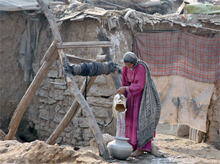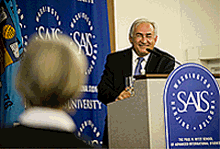
Typical street scene in Santa Ana, El Salvador. (Photo: iStock)
IMF Survey: IMF Key to Crisis Policy Response, Strauss-Kahn Says
April 24, 2009
- Global recession requires coordinated economic policies
- IMF has helped contain crisis and propose policy responses to it
- Strauss-Kahn says IMF adapts to demands of global crisis
Stronger coordination is needed among economic and financial sector policymakers around the world during the global recession and the IMF is well placed to help bring countries together to tackle their joint problems, Managing Director Dominique Strauss-Kahn said.

Uppermost of IMF’s goals: protect poorest, most vulnerable from ravages of global crisis, Strauss-Kahn says (photo: Farooq Naeem/AFP/Getty Images)
GLOBAL ECONOMIC CRISIS
In a broad-ranging speech that examined the role of the 65-year-old IMF in fostering the multilateralism essential to restoring global prosperity, Strauss-Kahn examined the role of the Fund during the crisis as a financial firefighter helping nations in economic distress, as a policy adviser to its 185 member countries, and as a provider of early warnings about problems developing in the international economic system.
A modest recovery
The global crisis is far from over. The latest IMF estimates show further economic deterioration. In an address to a conference at Johns Hopkins University’s School of Advanced International Studies, Strauss-Kahn said the forces pushing down economic conditions are stronger than those pushing in the other direction. As a result, 2009 will be a “horrible year,” he said. But the corrective policies governments are putting in place should help spawn a modest recovery in 2010, provided those policies continue in the right direction—especially efforts to clean bad assets off bank balance sheets..
The IMF has changed some of its approaches to give it more flexibility to aid in recovery, to get funds out quickly to countries that are pursuing sound policies but have been caught by the recession, he said. Member countries have pledged to increase its resources to help it lend on both an emergency and preventive basis. And uppermost in the IMF’s goals is to protect the poorest and most vulnerable from the ravages of the recession.
IMF role is key
The IMF—established in the wake of the Great Depression and World War II—remains “as central as ever” to macroeconomic and financial sector policy coordination, but it “took the worst financial crisis since the Great Depression for this to be manifest,” Strauss-Kahn said.
When the former French finance minister took over the multilateral institution in November 2007, it “was facing a progressive loss of relevance and legitimacy” and many questioned the need for the organization, he said. But 18 months later, after a crisis that has spread from a tiny part of the U.S. housing market to almost the entire world, it became clear that a global crisis demanded a multilateral solution and the IMF was perfectly placed to address financing and liquidity problems at the global level and conduct candid, independent, and evenhanded surveillance of global economic developments.
At its summit earlier this month, the Group of Twenty (G-20) industrial and emerging market economies reaffirmed that role. It not only called for a vast increase in IMF resources—from $250 billion to $750 billion—to enable it to assist with the growing financial requirements of member countries, but emphasized the need for the global monitoring that the IMF provides.
Fighting financial fires
The IMF, which will hold its Spring Meetings in Washington on April 25 and 26, has been thrust back into its role as financial firefighter, providing emergency assistance to countries in economic distress. Firefighters may seem “useless” in good times, Strauss-Kahn said, but the crisis has shown “they have a major role to play when things turn sour.”
The IMF has been active among all types of economies. It has helped emerging markets, especially in Eastern Europe, cope with the sudden stop in capital flows. It has extended help to advanced countries such as Iceland.

Strauss-Kahn: IMF-supported programs can succeed only if country owns them. “We have to be seen as doctors, not as cops” (IMF photo)


